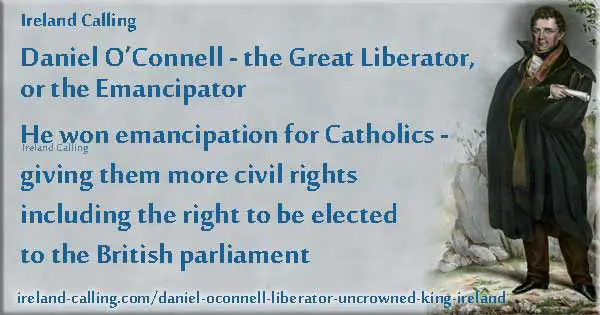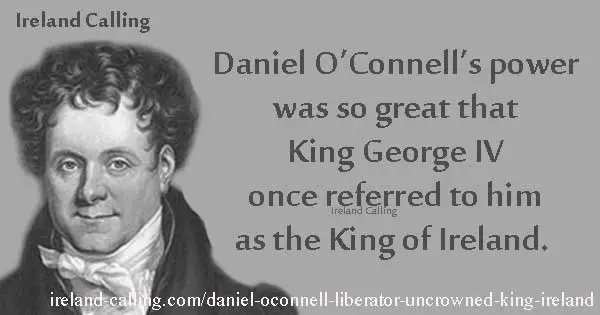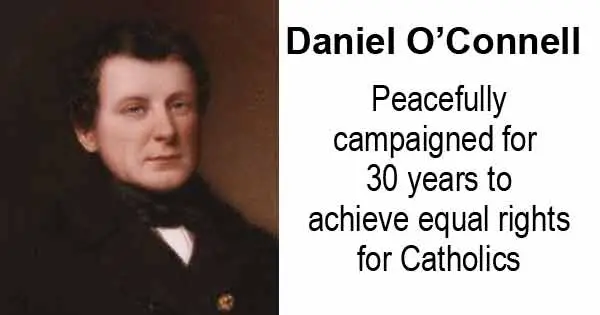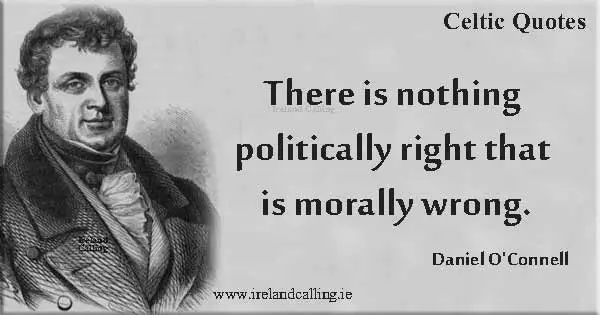Daniel O’Connell has gone down in Irish history as the Great Liberator, or the Emancipator.
He was the man who won emancipation for Catholics – giving them more civil rights including the right to be elected to the British parliament.

He also played a major part in removing the hated tithes, a tax by which the Catholic majority in Ireland had to pay for the upkeep the minority Protestant Church, and he helped to put repeal of Ireland’s union with Britain on to the political agenda.
O’Connell did all this using purely democratic means.
He abhorred violence so there was no recourse to threats or talk of revolution – although he did enjoy intimidating the establishment by holding monster meetings of his followers.
These often attracted up to a million people and demonstrated his power to mobilise the masses. However, he was quick to maintain that the meetings should always be peaceful.
His power was so great that King George IV once referred to him as the King of Ireland.

Daniel O’Connell was born in 1775 into a successful Catholic family in Kerry. He was a brilliant student but the Penal Laws, which put restrictions on the education of Catholics, meant that he had to go to school in France.
He became a barrister and for the first 20 years of his adult life he concentrated on establishing a successful legal practice.
His life changed in 1823 when he set up the Catholic Association to campaign for civil rights for Catholics.
The Association began as a largely middle class organisation with annual subscriptions set at 10 guineas.
It didn’t get very far and O’Connell quickly realised that it would have to have a much wider appeal if it was going to be successful.
With this in mind he opened it up to everybody with the membership fee being reduced to a penny a month, or a farthing per week.
It proved to be spectacularly successful. The Catholic Church came on board and provided a readymade infrastructure which made organisation much easier.
The subscriptions, which came to be known as the Catholic Rent, were collected each week at Sunday mass. Priests proved to be good administrators and were able to pass on information and organise volunteers in their parishes.
Within a few years the Catholic Association was a national organisation with hundreds of thousands of fee-paying members.
It became so influential that the government banned it. However O’Connell, drawing on his legal experience, knew that they were not doing anything for which they could be prosecuted.
He simply renamed the organisation the New Catholic Association and carried on as before. The government was powerless to stop him.
In 1828, O’Connell and the association decided to flex their muscles. The Penal Law meant that Catholics could not be elected to the British parliament.
O’Connell’s sharp legal mind realised there was nothing in the law to stop a Catholic standing for parliament and being elected.
The stumbling block only came when he tried take up his seat. He had to swear an oath denouncing his religion. This was impossible for Catholics and so effectively kept them out of power.
O’Connell decided to embarrass the government by winning elections in Ireland and creating situations where the winning candidates, the choice of the people, could not exercise their democratic right.
He judged that the obvious injustice of the situation would be too much for the government to defend, especially as there was some sympathy in England towards Catholic emancipation and civil rights.

O’Connell and the Association got a chance to test their strength in 1828 when there was to be a by-election for the Waterford seat.
It had been held by the Beresfords, wealthy Protestant landowners, for nearly a hundred years. There was no secret ballot in those days and so everyone knew how a person had voted.
It meant it was easy for landowners to intimidate voters by threatening to evict them from their land if they didn’t vote the right way.
At that time, the right to vote was restricted to people who paid more than 40 shillings a year in rent. These people made up most of the electorate and were known as the 40-shilling freeholders.
Their support was crucial if the Catholic Association was to win the election, yet they risked being evicted and losing their livelihoods if they voted against the Beresfords.
It seemed a lost cause but O’Connell and the association, with significant support from the church, campaigned hard to persuade the 40-shilling men to face down the landowner and vote for the Catholic candidate.
Against all the odds, the Catholic candidate won, thanks mainly to the tremendous courage of the tenants who risked everything for the cause.
More election successes followed and then in 1828, Daniel O’Connell decided to stand himself. Ironically, his opponent was a supporter of Catholic emancipation even though he was a Protestant.
The election was fought with dogged campaigning, as it had been at Waterford. The Church again played its part, with one priest even telling his parishioners that a man who had voted for the Protestant candidate fell dead immediately afterwards.
O’Connell won comfortably but as planned, refused to take an oath denouncing his religion.
His victory put the British government in a quandary. It was hard and embarrassing for them to justify a system that defied the democratic will of the people. They also feared that there could be an uprising if the Catholic majority didn’t get its way.
The Prime Minister, the Duke of Wellington, convinced King George IV that Britain would face outrage in Ireland if O’Connell was unable to take his seat in parliament.
The king reluctantly agreed and the Catholic Emancipation Bill became law in 1829. It meant all Christian faiths were able to sit in the House of Commons.
The actions of Wellington and O’Connell over the issue promoted King George to say: “Wellington is the King of England, O’Connell is King of Ireland, and I am only the dean of Windsor.”
It was a triumphant victory for O’Connell and his peaceful, democratic methods but the government extracted a major concession that left a bad taste in the mouths of many of his followers.
The qualification for voting in Ireland was raised to £10. This meant the forty-shilling freeholders, who had done so much to achieve Catholic Emancipation, were sacrificed at the last minute and lost their right to vote.
If this weighed heavy on O’Connell’s conscience he didn’t show it, and to be fair, it didn’t seem to affect his popularity. He went on to be one of the most influential politicians in Ireland and Britain, and was highly regarded by the radical, political elite across Europe.

If the British government of the day thought O’Connell might quieten down after winning emancipation they were wrong.
He was to torment them for the next two decades as he campaigned for repeal of the Act of Union, which joined Ireland with Britain, and terrified the establishment with his monster meetings.
